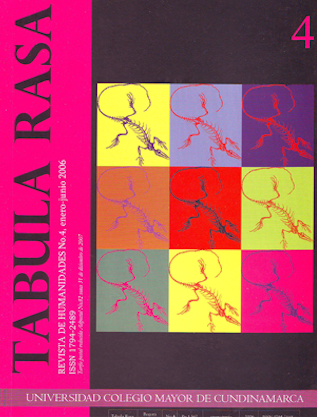Desafío total: psicología, psicoanálisis y virtualidad
Total Challenge: Psychology, psychoanalysis and virtuality
Mostrar biografía de los autores
Algunas de las especulaciones acerca de la relación entre tecnología y la naturaleza humana que se encuentran en los escritos de Ciencia Ficción del último medio siglo han pasado a formar parte del lenguaje y la cotidianidad de los sujetos post-industriales. Los futuros que se dibujan en los textos de Ciencia Ficción ayudan a entender en qué nos hemos convertido. Las nuevas formas de experiencia, las relaciones sociales y las formas de subjetividad que se hallan en la Ciencia Ficción pueden considerarse como recursos legítimos para el examen del presente. Y, en la medida que el pasado se reproduce a partir de nuevos sistemas dominantes de significados, lo que entendemos como realidad a partir de la tecnología y la naturaleza empieza a desaparecer. A menudo se llega a esta situación cuando no se sabe qué realidad es la correcta entre la miríada de realidades alternativas. Este artículo explora el modo en que el discurso psicoanalítico, tan enraizado en la cultura popular, encuentra en la psicología uno de sus máximos exponentes para fomentar subjetividades en armonía con la sociedad contemporánea.
Visitas del artículo 296 | Visitas PDF 195
Descargas
Baudrillard, J. 1990. Revenge of the Crystal: selected writings on the modern object and its destiny, 1968-1983. Londres: Pluto Press.
Benedikt, M. (comp.) 1991. Cyberspace: First Steps. Cambridge, MA.: MIT Press. Burman, E. 1994. Deconstructing Developmental Psychology. Londres:
Routledge [La Deconstrucción de la Psicología Evolutiva, Madrid: Visor, 1998].
Burman, E. (comp.) 1999. Deconstructing Feminist Psychology. Londres: Sage.
Dick, P. K. 1963. The Game Players of Titan. New York: Ace.
Dick, P. K. 1964. Martian Time Slip. Londres: Victor Gollancz
Dick, P. K. 1966. «We Can Remember It For You Wholesale». In P. K. Dick (1991 We Can Remember It For You Wholesale: Collected Stories of Philip K. Dick, Volume 5, (pp. 205 227). Londres: HarperCollins.
Dick, P. K. 1967[1990]. Counter Clock World. Londres: HarperCollins [El mundo contra reloj, Edaf, Colección Ciencia Ficción, nº 25, 1980].
Dick, P. K. 1969[1973]. Ubik. Londres: HarperCollins [Martínez Roca, Colección Superficción, nº 111, 1988].
Forrester, J. 1980. Language and the Origins of Psychoanalysis. Londres: Macmillan.
Foucault, M. 1969[1972]. The Archaeology of Knowledge. Londres: Tavistock [La arqueología del saber, Madrid: Siglo XXI, 1970].
Freedman, C. 1984. «Towards a theory of paranoia: The science fiction of Philip K. Dick». Science Fiction Studies, 11:15-24.
Gergen, K. J. 1991. The Saturated Self. New York: Basic Books [El yo saturado. Barcelona: Paidós, 1992].
Gordo López, A. J. y Cleminson, M. R. 2004. Techno-Sexual Landscapes: Changing Relations Between Technology and Sexuality. Londres: Free Association Books.
Gordo López, A.J. y Macauley, W. R. 1996. «Hibridación y purificación en el espacio cibernético: Una aproximación discursiva». En A.J. Gordo López y J.Linaza (eds.), Psicologías, Discursos y Poder (PDP). Madrid: Visor.
Gordo López, A. J. y Parker, I. (comps.) 1999. Cyberpsychology. Londres: Macmillan. Hebdige, D. 1986. «A Report on the Western Front: Postmodernism and the ‘Politics’ of Style». Block, 12: 4 26.
Ingleby, D. 1985. «Professionals as socializers: the ‘psy complex’». Research in Law, Deviance and Social Control, 7, 79 109.
Jay, M. 1986. «In the Empire of the Gaze: Foucault and the Denigration of Vision in 20th Century French Thought». In L. Appignanesi (Ed Postmodernism, ICA Documents 4 (pp.19 25). Londres: Institute for Contemporary Arts.
Kvale, S. (comp.) 1992. Psychology and Postmodernism. Londres: Sage.
Lacan, J. 1973[1979]. The Four Fundamental Concepts of Psycho Analysis, Harmondsworth: Penguin [Los cuatro conceptos fundamentales del psicoanálisis, Barral]
Lacan, J. 1977. Ecrits. Londres: Tavistock [Escritos, México: Siglo XXI, 1975]
Lasch, C. 1978. The Culture of Narcissism: American life in an age of diminishing expectations.
New York: Norton.
Lyotard, J. F. 1979[1984]. The Postmodern Condition: A report on knowledge. Manchester: Manchester University Press [La condición postmoderna, Madrid: Cátedra, 1984].
Makulowich, J. S. 1993. «Awesome Sites». World Wide Web Newsletter, 1: 13 & 20.
Mandel, E. 1974. Late Capitalism Londres: New Left Books.
Moscovici, S. 1986. La Psychanalyse: Son Image et Son Public (Deuxieme Edn Paris: Presses Universitaires de France.
Parker, I. 1989. The Crisis in Modern Social Psychology, and how to end it. Londres: Routledge. (www.discourseunit.com)
Parker, I. 1992. Discourse Dynamics: Critical Analysis for Social and Individual Psychology. Londres: Routledge. (www.discourseunit.com)
Parker, I. 1997. Psychoanalytic culture: psychoanalytic discourse in western society. Londres: Sage.
Parker, I. 1998 «Against Postmodernism: Psychology in Cultural Context», Theory & Psychology, 8, (5): 621-647
Parker, I. 2002. Critical Discursive Psychology. Londres: Palgrave.
Parker, I. 2004. Slavoj Žižek: A Critical Introduction. Londres: Pluto Press.
Parker, I. 2005. Qualitative Psychology: Introducing Radical Research. Buckingham: Open University Press.
Rorty, R. 1980. Philosophy and the Mirror of Nature. Oxford: Basil Blackwell.
Rose, N. 1985. The Psychological Complex: psychology, politics and society in England 1869 1939. Londres: Routledge & Kegan Paul.
Sutin, L. 1989[1991]. Divine Invasions: A Life of Philip K. Dick. Londres: Paladin.
Verhoeven, P. 1990. Total Recall. New York: Tristar Films [Desafío Total].
Žižek, S. 1989. The Sublime Object of Ideology. Londres: Verso.
Žižek, S. 1990. «Eastern Europe’s republics of Gilead». New Left Review, 183: 50-62.
Žižek, S. 1991. For they know not what they do: Enjoyment as a political factor. Londres: Verso




